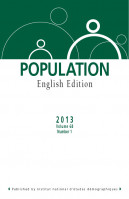
Population 2013, n 1
2013
ECAF project
- Sexuality, Contraception, Unplanned Pregnancies and Abortion in West Africa and Morocco: The ECAF Survey - Introduction
Normative Tensions and Women’s Contraceptive Attitudes and Practices in Four African Countries - Nathalie Bajos, Maria Teixeira, Agnès Adjamagbo, Michèle Ferrand, Agnès Guillaume, Clémentine Rossier, ECAF team
- Sexual Debut in Rabat: New "Arrangements" between the Sexes - Fatima Bakass, Michèle Ferrand, ECAF team
- Influence of Relationship Situation on Responses to Unintended Pregnancy in Dakar - Agnès Adjamagbo, Pierrette Aguessy Koné, ECAF team
- Premarital Sexuality, Gender Relations and Unplanned Pregnancies in Ouagadougou - Clémentine Rossier, Nathalie Sawadogo, André Soubeiga, ECAF team
- Provider Attitudes to Emergency Contraception in Ghana and Burkina Faso - Susannah Mayhew, Ivy Osei, Nathalie Bajos, ECAF team
ARTICLE
- Contemporary Migration Theories as Reflected in Their Founding Texts - Victor Piché
BOOK REVIEWS
Normative Tensions and Women’s Contraceptive Attitudes and Practices in Four African Countries
Nathalie Bajos, Maria Teixeira, Agnès Adjamagbo, Michèle Ferrand, Agnès Guillaume, Clémentine Rossier, the ECAF team
Conventional analyses of the obstacles to contraceptive use in Africa focus on the social value attributed to high fertility, the fear of side effects and problems of accessing contraception. This article studies the range of situations that can lead to unplanned pregnancy and aims to identify the social rationales that foster such situations. Two hundred semi-structured interviews were conducted in 2006-2007 in the capitals of Burkina Faso, Ghana, Morocco and Senegal as part of the survey on Emergency Contraception in Africa (ECAF). The analyses reveal that simultaneously trying to observe reproductive and sexual norms - in which a double standard prohibits premarital sex for young women while endorsing the primacy of male sexual pleasure - leads to unprotected or poorly protected intercourse. While the factors are relatively similar in the four countries, the rigidity of the norms in question differs from one to another, notably with regard to premarital sexuality. Finally, the question of effective contraceptive use goes far beyond the issue of «unmet needs», a central concept in the literature which focuses on non-use of contraception.
Sexual Debut in Rabat: New "Arrangements" Between the Sexes
Fatima Bakass, Michèle Ferrand, the ECAF team
The social and religious order in Morocco is still based on such values as the honour and good name of the family wherein premarital female sexuality is proscribed and an intact hymen is irrefutable evidence of a successful family upbringing. Using data from the 2006-2008 ECAF qualitative survey, this article shows that the combined effects of economic crisis (reducing young men’s access to the labour market and their ability to support a family) and more widespread access to education (particularly for girls) have delayed age at marriage and encouraged the development of premarital sexuality. Unmarried people live out a continual tension between their emotional and sexual aspirations, and the need to observe the social and religious norms that hold extra-marital sexuality to be deviant. As sexual behaviour is increasingly perceived as an individual experience, so each young person engages in a sort of "cultural improvization" made possible because sexual behaviour is not directly observable and social control is weakening amid rapid social change. The practice of non-penetrative sex is an innovative "arrangement" between the genders that enables them to contravene the ban on premarital sexuality and yet comply with the key requirement of female virginity.
Influence of Relationship Situation on Responses to Unintended Pregnancy in Dakar
Agnès Adjamagbo, Pierrette Aguessy Koné, the ECAF team
Many studies have highlighted the rise in unplanned pregnancies among young women in sub-Saharan Africa but few have focused on concomitant changes in young Africans’ aspirations with regard to sexuality and parenthood. On the basis of a study in Dakar, the capital city of Senegal, this article analyses the complexity of the individual and collective issues involved in responses to unintended pregnancy, showing that this notion speaks to a broader reflection on the question of contraception at the start of sexual life. The study is based on 74 life story interviews (49 with women, 25 with men) conducted between 2007 and 2008 in the framework of ECAF (Emergency Contraception in Africa), a research programme funded by the European Union. Data were collected by means of a qualitative biographical approach that provides an overall view of individuals’ residential, educational, occupational, affective and/or conjugal trajectories and contraceptive histories. Attitudes to motherhood are found to be structured by four dimensions: the social legitimacy of the relationship in which the pregnancy occurs, power relations among the various protagonists (individuals, couples, families and/or social circle), gender-based power relations, and increasingly precarious living conditions.
Premarital Sexuality, Gender Relations and Unplanned Pregnancies in Ouagadougou
Clémentine Rossier, Nathalie Sawadogo, André Soubeiga, the ECAF team
Premarital sexual relations are becoming more common in Africa, a trend which is especially prevalent in urban settings. Although unmarried youth increasingly use condoms, many studies highlight considerable unmet contraceptive needs in this population subgroup. This article is based on qualitative data gathered in 2006 and 2007 in Ouagadougou, Burkina Faso through 77 in-depth interviews with young women and men conducted for the Emergency Contraception in Africa (ECAF) survey. The authors show how unequal gender relations lead to unplanned premarital pregnancies. As in the past, young women’s sexual activity before marriage is marked by a quest for morality and marriage, even if marriage is postponed. Male premarital sexual activity is often characterized by the positive value attached to multiple partners and to men’s pleasure. These contrasting rationales for premarital sex can lead individuals either to seek ways of avoiding pregnancy at all costs or to neglect prevention. Unplanned pregnancies occur when one of the two partners adheres to more than one rationale and/or when the two partners adhere to different rationales. In the latter case, the asymmetry between men’s and women’s motivations weakens women’s bargaining power over the use of condoms.
Provider Attitudes to Emergency Contraception in Ghana and Burkina Faso
Susannah Mayhew, Ivy Osei, Nathalie Bajos, the ECAF team
There are few studies in sub-Saharan Africa on providers’ attitudes and delivery practices regarding emergency contraception (EC), though they could provide an important component of contraceptive programmes there. Thirty-one semi-structured interviews were conducted with a purposive sample of reproductive health service providers in Ghana and Burkina Faso as part of the Emergency Contraception in Africa study (ECAF) conducted in 2006-2007. A typology of provider-responses was constructed using two dimensions reflecting providers’ "acceptance" and "provision" of EC. Provider attitudes broadly favoured EC, although most in Burkina Faso were cautious about providing it (fearing that regular use might displace condom use, thus increasing HIV risk), while in Ghana, many highlighted useful role of EC in reducing unwanted pregnancy. Overall, respondents wanted to limit distribution to health facilities and pharmacies and were reactive, rather than proactive, EC providers. Their attitude towards people seeking emergency contraception varied: those suffering contraceptive method failure or provider failure were seen as deserving, while those who came because they had used their contraceptive method incorrectly or not used one at all were regarded less favourably.
Contemporary Migration Theories as Reflected in Their Founding Texts
Victor Piché
This article aims to explore the development of contemporary migration theories as reflected in some twenty founding texts brought together for the first time in a single volume (Piché V., 2013, Les théories de la migration, INED). Each text marks a major advance in the understanding of migration, its causes and its effects. Together, they bear witness to the emergence of theories which, after initially focusing on micro-individual approaches centred on cost-benefit analysis, gradually move on to incorporate macro-structural factors. Analysis of migration networks is a key component of explanatory frameworks and of studies to determine the effects of migration on economic development. A gendered approach to migration decision-making rounds off this analysis. The analytical framework developed here presents migration as a multifactorial and multidimensional phenomenon combining three main dimensions: origin and destination; micro, meso, macro and global analysis levels; economic, social and political aspects. Far from competing, these approaches each provide specific new insights. They must all be considered when seeking to explain migration or to assess migration policy.
This article is accessible online in the "Download(s)" box
Prix TTC : 20,00 €

